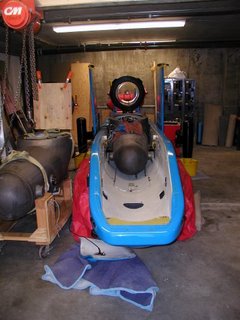
Graham Hawkes builds underwater craft, but they're not submarines. They are acurately described as water planes. They fly underwater.
Graham Hawkes is friendly enough but reserved. He’s got the demeanor of a man whose shared his story and his vision so many times that he might be getting tired doing it. Still, he’s willing to talk to me, because it’s just a numbers game and at some point, people will really start to listen if the message is presented frequently enough.
I spoke with him in his San Francisco workshop a couple of years ago when I was working on a story. The picture at left shows one of his underwater craft being overhauled.
He said, “The first thing to remember is that there is a distinct similarity between vehicles that travel through the air like airplanes and vehicles that travel through the water like submarines. Both water and air are fluids and the physical laws and engineering models that govern the propulsion and steering of the machines that travel through them are far more similar than they are different.”
That made sense, so I asked, why do submarines and airplanes look and work so differently?
“It’s the wrong analogy,” says Graham. “A submarine does of course, travel through a fluid, water but it does so like a blimp or a hot air balloon, a lighter-than-air air ship, not like an airplane. Basically, a submarine is a lighter-than-water craft that uses ballast tanks and weights to allow the ship’s pilot to move up or down, to go to the bottom or up to the surface. The sub moves forward because it is shoved through the water by the action of a propeller.”
I began to see his point. Even the most modern, most highly sophisticated submarines, like the US Navy’s Virginia class attack subs or the giant Russian Severodvinsk series, are just basically dirigibles immersed in the sea - big, powerful, sophisticated balloons - using the same principles of fluid motion as the Zeppelin Von Hindenberg. Once he pointed that out, it is seemed to me that both the USS Seawolf and the Goodyear Blimp look much more similar to each other than the Seawolf and a B-52.
It’s amazing, really, that so little research work has been done on underwater flight. In the world under the water, it’s as if the Wright Brothers never built their airplane and the underwater "skies" are filled with high powered balloons, blimps, and dirigibles instead of winged aircraft.
No comments:
Post a Comment